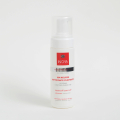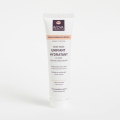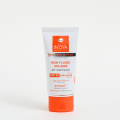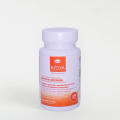Albino Skin: Unique Dermatological Needs Still Overlooked
Albinism: More Than Just a Lack of Pigmentation
Albinism is a group of rare genetic disorders characterized by a deficiency or near-total absence of melanin, the pigment responsible for coloring the skin, hair, and eyes.
Contrary to popular belief, albino skin is not simply very white—it functions differently and has specific characteristics that require a tailored skincare routine:
- No natural protection against UV (melanin absorbs UVB),
- Thinner, more fragile, more sensitive skin barrier,
- Exaggerated reactions to sun, wind, friction, and chemical aggressions.
Result: depigmented skin is prone to dryness, redness, burns, and has a higher risk of precancerous lesions (actinic keratoses) and early skin cancers.
Why Does This Skin Have Such Specific Needs?
1. Total Absence of Melanin = Zero Natural Filter
Melanin plays an essential photoprotective role. Dark black skin is equivalent to a natural SPF of 13 to 16. In comparison, albino skin has a natural SPF close to zero.
This means that:
- Sunburns occur almost instantly, even on cloudy days,
- UV-induced cellular damage is deep,
- Premature skin aging is accelerated.
2. Vulnerable, Dry, and Reactive Skin
Albino skin is generally thinner, less pigmented (thus more transparent), and often drier due to low sebaceous gland activity.
It does not tolerate well:
- Harsh cleansers (soaps, sulfates),
- Highly concentrated or perfumed products,
- Inappropriate mechanical or chemical exfoliants.
That’s why a dermocosmetic routine adapted to depigmented skin is essential.
3. Daily Discomfort Too Often Minimized
Most people with albinism suffer from:
- Tightness,
- Chronic redness,
- Peeling skin,
- Strong reactions to extreme temperatures (hot or cold).
Yet very few brands offer dermocosmetic products specifically designed for skin without melanin.
What Dermocosmetic Solutions Are Truly Suitable?
1. Gentle, Non-Irritating Cleansing
Albino sensitive skin requires a soap-free cleanser with physiological pH that respects the skin barrier.
Look for: plant-based cleansing base, purifying zinc, soothing allantoin, plant extracts.
My Purifying Cleansing Foam CLEAN’OYA® gently cleanses without alcohol or irritating fragrance, perfect for a daily albino skincare routine.
2. Targeted Hydration and Barrier Reinforcement
To restore skin comfort, use a light, non-greasy cream rich in moisturizing and soothing agents.
Key ingredients: vegetable glycerin, hyaluronic acid, niacinamide, pea extract.
My Moisturizing Unifying Care MEL’OYA® deeply hydrates, strengthens the skin barrier, and helps unify the complexion. Ideal for sensitive, depigmented skin.
3. High-Tolerance Sunscreen, No White Cast
Skin without melanin must be protected daily with SPF 50+, even indoors.
Preferred ingredients: photostable UV filters, vitamin E, glycerin, chicory extract (vitamin D-Like).
My SPF50 SUN’OYA® Fluid offers invisible, non-comedogenic sun protection, perfectly suited for depigmented or albino skin.
4. Internal Protection and Antioxidant Defense
The ideal routine also includes in & out sun protection by combining topical care and targeted supplements.
Key actives: copper, selenium, vitamins C & E, melon SOD, grape polyphenols, hyaluronic acid, hibiscus.
SUN’OYA® DEFENSE boosts natural defenses, protects cells from oxidative stress, and supports normal pigmentation, even in people with albinism.
What This Reveals: A Need for Dermocosmetic Inclusion
Albino individuals are often invisible in beauty campaigns, clinical trials, and skincare lines.
They are neither represented in “classic sensitive skin” products nor in “black skin” ranges.
At IN’OYA, we chose to:
- Study the biology of depigmented skin,
- Develop truly tolerated solutions,
- Integrate all skin tones into our inclusive dermatological beauty vision.
In Summary
Albino skin is not simply very fair—it is highly specific and deserves a targeted dermocosmetic approach.
Gently cleanse, deeply hydrate, protect from the sun, and reinforce from within: this is the key to meeting its invisible but very real needs.





